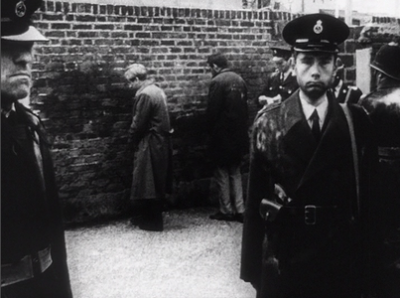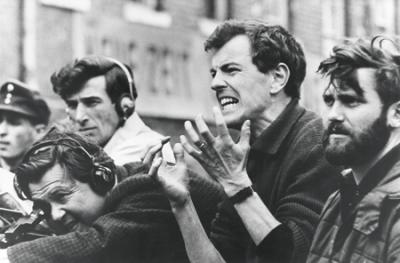
The War Game Files Broadcast BBC Radio 4 June 6, 2015 20:00
Producer: David Morley A Bite Media Production for BBC Radio 4
The War Game Files, a radio documentary narrated by filmmaker Michael Apted, is a rare thing indeed. An excavation of one of the most contested scandals in British broadcasting, it clearly and cogently engages listeners on issues of censorship and broadcast standards from a decidedly more paternalistic time, while simultaneously offering new evidence that helps clarify historiographical discussions that have occupied media historians over the last decade.
Filmmaker Peter Watkins was a rising star at the BBC, a young man who had successfully made the leap from amateur larks to innovative, professional television work with Culloden (1964), a blend of documentary and dramatic aesthetic tropes that visualized the 1746 battle (the last conventional square-off on British soil) for a mass audience. Watkins smartly integrated interviews, the direct address of the camera, and the on-location conventions of news reportage with landscapes, costumes, and manners of speech that all signal an unparalleled attention to historical detail. For The War Game — conceived before Culloden, but put into production only after the success of his first telefilm — Watkins wanted to use a similar set of techniques for a speculative future. The premise of the film is disarmingly simple: what would happen to British society and infrastructure in the event of a nuclear attack? The answer, as Watkins wanted to show with unflinching clarity, is complete and overlapping catastrophe. Based on his research, civil defense planning was inadequate. In addition to the deaths caused by initial blasts, fallout, famine, total breakdown in public order, and the disintegration of social bonds were just as much of a problem.

Watkins made his film, but it was never broadcast. Famously, the BBC declined to show the finished project, and claims to have made this decision entirely on its own. The War Game Files uses memoranda from the BBC archives, new interviews, and previously unavailable documents gathered together by film historian John R. Cook through the Freedom of Information Act to figure out who was responsible for suppressing Watkins’s film, and for what reasons. Even though The War Game eventually circulated widely — it was distributed on 16mm by the British Film Institute, and won an Academy Award for Best Documentary film in 1967 — it caused Watkins to lock horns with the BBC, prompting a career in which he moved around the world, making radical films in exile. Watkins now lives in France, in semi-retirement. His last completed film is La Commune (2000), a recreation of the Paris Commune of 1871, as devised by Watkins and a group of politically engaged non-professional actors, a telefilm almost alone in its attempt at visualizing the epic sweep of history by way of a democratized, collective collaboration.
The War Game Files provides a lucid reading of the saga of The War Game by examining the central tension in studies of its production and release. On the one hand is Watkins’s own, longstanding claim (also endorsed by Joseph Gomez and, in a more recent historiographic debate, by Mike Wayne) that the BBC deliberately suppressed his film because of its politically incendiary content — because it revealed inadequacies of governance and planning, and showed that the public did not fully understand the implications of the bomb based on information known to the government. While the BBC claims that its reasons for not showing the film mainly had to do with the fact that it might scare viewers (particularly isolated and elderly viewers, who might take its realistic vision as reportage of fact), the suspicion has always been that outside pressure informed the BBC’s decision. For a publicly-minded corporation that always stresses its removal from Whitehall, this is a serious concern. On the other hand, historian James Chapman, who wrote about the film in relation to archival holdings maintained internally by the BBC, argued that the decision was (based on those accounts) an ad hoc decision of policy arrived at through internal discussion, and not out of any conspiratorial sort of censorship. The BBC was not acting on Whitehall’s orders. Chapman’s work has prompted a back-and-forth with Mike Wayne, who maintains the reading that the film was not shown for reasons endorsed by the government.
The War Game Files picks up this debate, weighing the BBC’s policies and Watkins’s perception of the treatment of his film against new evidence gleaned from government files. Abstracted a bit from the particular story of this documentary is a wider set of concerns from the first few decades of television. How powerful is the new medium? How much more dangerous might it be to simultaneously broadcast a challenging film into homes where people might not be prepared for what they are seeing, as opposed to the power of the same film in a cinematic setting, where one has to make a deliberate choice to go see it? How can big organizations like the BBC and the government in power distance themselves from potentially embarrassing material, while at the same time not implicating themselves in suppression through heavy-handed censorship decisions?
This radio documentary is, in some ways, framed as a personal quest for truth against larger institutional forces. As with other narratives surrounding this film, Watkins is placed against big bureaucracies like the BBC and the Cabinet Office. But, this is also a personal story for John Cook, who has published extensively on Watkins, and for host Michael Apted, one of the many politically engaged artists of the 1960s who viewed Watkins as the fearless voice of a younger generation.
The evidence from the Cabinet Office Files — letters and memoranda that circulated among top officials, civil servants, and members of Harold Wilson’s cabinet — are excerpted and read in minimally stylized voices that recreate the widespread sense of concern that hangs over the mid-1960s. Cook reveals that Harold Wilson’s center-left Labour government was preparing to announce a review of civil defense policies just as The War Game came onto its radar. And, it seems, the debate over the film goes back well before Hugh Carlton-Greene’s announcement that it was not to be broadcast in late November 1965. In his research and fact-finding, Watkins contacted a few MPs, who in turn contacted Dennis Winter, the BBC liason at the Home Office, who relayed “concerns” to Carlton-Greene, who in turn advised Controller of Programmes Huw Wheldon and Director of Television Kenneth Adam. The War Game Files reveals a compromise: Winter and BBC Director of Administration John Arkell advocated close Whitehall involvement, while Adam and Wheldon wanted Watkins to be able to make a film with minimal interference. The result, though, was “a muddy middle ground between autonomy and collaboration,” that would often result in Watkins not knowing where he stood. The concern and questioning culminates with a screening in September 1965, in which Burke Trend and others associated with Whitehall and the military watched the film. Watkins heard of this and resigned from the BBC, taking a (briefly held) job at Albert Finney’s Memorial Enterprises (the film production company responsible for, amongst others, Lindsay Anderson’s 1968 anti-establishment film if…). Lord Norman Brook, Chairman of the Board of Governors of the BBC, met with government officials at the Cabinet Office at 9:45 am on November 5, after which time he did not think it should be shown. By the end of the month, the BBC had announced that it was not going to show the film, a decision they claimed to have made internally.
The question of who made the final, binding decision remains unsettled. Hugh Carlton-Greene was out of the country when Norman Brook had his meeting. Carlton-Greene both claimed sole responsibility and also explained that he decided in collaboration with Brook. Some speculate that Brook made the decision, as Carlton-Greene had previously courted controversial programmes that were critical of the government, such as the comedy-satire That Was the Week that Was (1962-3).
The War Game Files avoids getting too mucked up in the bureaucratic back-and-forth, especially through its use of interviews (with, among others, Sir Christopher Bland, and the film’s stunt coordinator, Derek Ware). Although clearly on Watkins’s side, the documentary stops short of canonizing him a saint thanks to some examples of his unfortunate choices made during the making of the film. Ware reveals that much of it was shot without permits, which lead to some run-ins with police. Actor’s Equity disliked Watkins’s preference for non-professional actors (he maintained a commitment to aspects of amateur filmmaking throughout his career). Peter Watkins, the uncompromising young maverick, actively worked against the social and cultural conservatism of those with the power to prevent his film from being shown, and he paid the price for it.
In balancing the sources of this complicated story of collusion, censorship, and civil policy, The War Game Files necessarily has to jump around in the timeline of events. While this ultimately makes for a more compelling radio program — it hooks you in the beginning and then fills in details later - -it also makes it somewhat confusing as a work of historical interpretation. A companion website or small book would be most welcome. That The War Game Files was made at all is cause for celebration, as it illuminates one of the most important television scandals in the history of British broadcasting, and helps us understand the motives and madness of one of Britain’s greatest and most neglected filmmakers. Yet, it is somewhat odd that this story be told in the aural medium of broadcast radio (or, as I experienced it, after the fact on BBC iPlayer), as it is about a visual artifact whose images still shock and confound. If anything, The War Game Files makes the whole debate into one of the period’s great symptomatic historical events, almost on par with the Profumo Affair in its widespread cultural resonances.
References
Chapman, James. “The BBC and the Censorship of The War Game (1965).” Journal of Contemporary History 42.1 (2006): 75-94. Print.
Cook, John R. “The War Game: how I showed that BBC bowed to government over nuclear attack film.” The Conversation. 2 Jun 2015. Web. http://theconversation.com/the-war-game-how-i-showed-that-bbc-bowed-to-government-over-nuclear-attack-film-42640. 8 Jul 2015.
Duffy, Judith. “Secret files reveal BBC colluded with Whitehall to ban its own nuclear war film.” Herald Scotland. 31 May 2015. Web.
Gomez, Joseph. Peter Watkins. Boston: Twayne Publishers, 1979. Print.
Watkins, Peter, dir. The War Game. BBC, 1966. Film.
Wayne, Mike. “Failing the Public: The BBC, The War Game, and Revisionist History.” Journal of Contemporary History 42.4 (2007): 627-637.